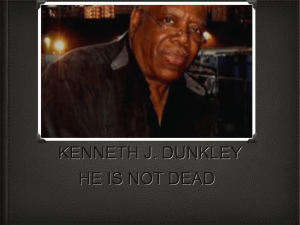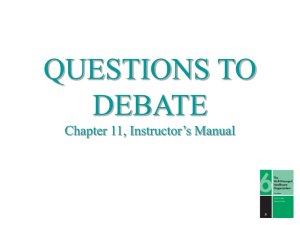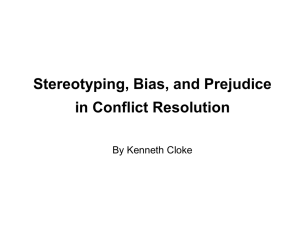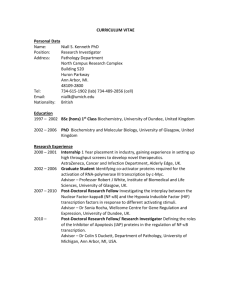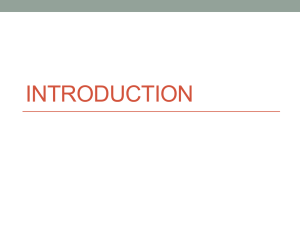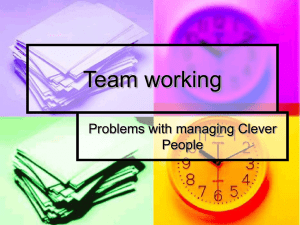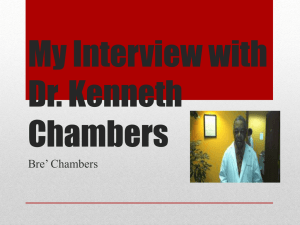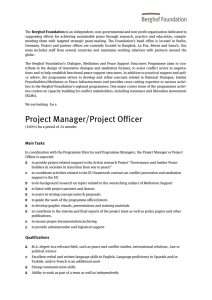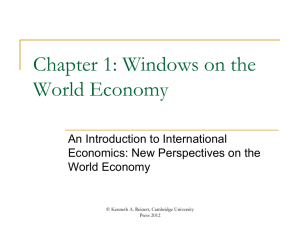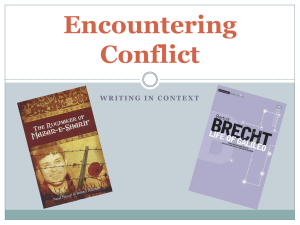Kenneth Cloke Power Point
advertisement
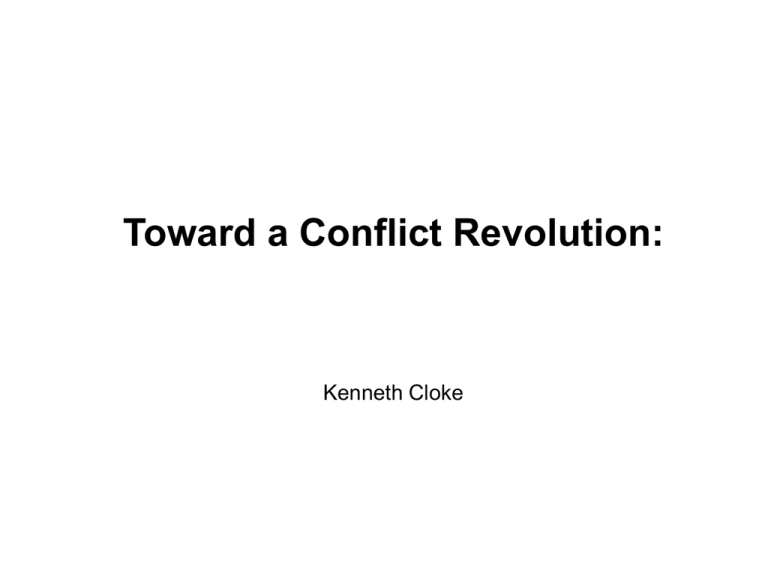
Toward a Conflict Revolution: Kenneth Cloke “If we listen attentively, we shall hear amid the uproar of empires and nations, the faint fluttering of wings, the gentle stirring of life and hope. Some say this hope lies in a nation, others in a man. I believe, rather, that it is awakened, revived, nourished by millions of solitary individuals whose deeds and words every day negate frontiers and the crudest implications of history.” Albert Camus © Kenneth Cloke 2 The Global Nature of Conflict • Every conflict takes place not only between individuals, but within a context, culture, and environment; surrounded by social, economic, and political forces; inside organizational systems, structures, and technological settings; among a diverse community of people; at a particular moment in time and history; on a stage, milieu, or backdrop. • None of these elements is conflict-neutral. Each contributes – sometimes in veiled and unspoken, yet profound ways to the nature, intensity, duration, impact, and meaning of our conflicts. • Each profoundly affects the quality of our lives, our personal capacity for joy and compassion, and our ability to survive as a planet. • Like ripples in a pond, each conflict and each resolution extend outward, impacting others and creating a “butterfly effect.” • As a result, we are each responsible as global citizens for building conflict resolution capacity around the world. © Kenneth Cloke 3 What are Chronic Conflicts? Chronic conflicts are those that nations, societies, organizations or individuals •Have not fully resolved •Need to resolve in order to grow and evolve •Are capable of resolving •Can only resolve by abandoning old approaches and adopting new ones •Are resistant to resolving because they are frightened, dissatisfied, insecure, uncertain, angry, or unwilling to change 4 © Kenneth Cloke Features of Chronic Conflict Chronic conflicts can often be distinguished by their: • Repetition • Low levels of resolution • Incongruity between high level of emotion and apparent triviality of the issues over which people are fighting • Being commonly mistaken for miscommunications or personality clashes • Tolerance of disrespectful and adversarial behaviors, • Seeming irrationality • Accidental misunderstandings • Idiosyncratic circumstances • Underlying similarities © Kenneth Cloke 5 10 Meta-Sources of Chronic Conflict 1. 2. 3. 4. 5. 6. 7. 8. 9. 10. Environmental deterioration Social inequality Economic inequity Political autocracy War and military approaches Hyper-competitive capitalist markets Prejudices and biases Narrow nationalism and isolationism Hierarchy, bureaucracy and corruption Power and rights based systems, institutions and processes © Kenneth Cloke 6 • • • • • • • • • • Problems that are Global in Nature (1) The size and density of human populations CO2 and methane emissions that are resulting in global warming The destructive power and availability of military technology Species extinctions and loss of tropical rainforest and woodland Loss of potable water and arable land Resistance to antibiotics and cost of medical care Vulnerability to pandemics, natural catastrophes, and severe weather conditions Loss of bio-diversity Unregulated economic transactions The global impact of local, relatively minor environmental decisions 7 © Kenneth Cloke Problems that are Global in Nature (2) • Nuclear proliferation, willingness to use war and resort • • • • • • • • • to violence Terrorism and cycles of revenge and retaliation Acceptability of the use of torture and cruelty Intentional targeting of civilians in warfare Global financial crisis and unregulated economic transactions Continuing poverty, social inequality and economic inequity Destabilization due to political autocracy and dictatorship Rise in prejudice and intolerance Genocidal policies and “ethnic cleansing” Growth of the drug trade, sexual trafficking, and organized crime © Kenneth Cloke 8 What Won’t Be Able to Solve Them • Military force and coercion • Treaties and international agreements • Legal interventions and the rule of law • Adversarial styles of negotiation • Traditional rules and regulations, policies and procedures • Diplomacy • Nation states and political governments • Capitalism and market principles • The United Nations, as presently constituted © Kenneth Cloke 9 A Diagram of Exponential Change 0 AD 1500 © Kenneth Cloke 1900 1950 2050 10 What We Can Predict • That global problems will become more widespread, severe, impactful, common and costly; • That conflicts will be triggered by these problems, and escalate as more individuals, groups, nations and ecosystems are impacted; • That conflicts will accumulate around the failures in local, national and global response systems; • That the ability to resolve these conflicts quickly and effectively will have a direct impact on the amount and severity of the damage they create; • That mediation, collaborative negotiation, dialogue, and allied conflict resolution methodologies will increasingly be needed to address and resolve disputes that result from efforts to act beyond borders. © Kenneth Cloke 11 Cultural Obstacles to Change • Conditioned passivity and reactiveness • Rewards for competition, narrow focus and selfishness • Fear of failure or punishment • Cynicism, apathy, control-orientation and obedience • Stories of victimization and demonization • Reliance on external discipline and authority from above • Isolation, lack of communication and social fragmentation • Conflict avoidance, accommodation and aggression • Acceptance of covert behavior and mediocrity • Lack of ownership of “someone else’s problem” © Kenneth 12 7 Core Skills to Recover from Conflict 1. Communication skills to reduce bias and prejudice and engage in constructive dialogue 2. Negotiation skills to solve problems and settle differences 3. Emotional skills to work through rage and guilt and assuage grief and loss 4. Mediation skills to resolve disputes collaboratively 5. Community building and public dialogue skills to develop interest-based, collaborative leadership and become productive, functional communities again 6. Heart and spirit enhancing skills to rebuild empathy and compassion and encourage forgiveness and reconciliation 7. Conflict resolution systems design skills to prevent and resolve future disputes before they become intractable © Kenneth Cloke 13 12 Conflict Resolution Methodologies 1. Interest-Based Negotiation 2. The Multi-door Courthouses 3. Prejudice Reduction and Bias Awareness 4. Cross-Cultural Mediation 5. Public Policy and Environmental Mediation 6. Victim-Offender Mediation and Restorative Justice 7. Public Dialogue and Community Building 8. Nonviolent Communication and Appreciative Inquiry 9. Transformative, Transcendent, and Heart-Based Mediation 10. Truth and Reconciliation Commissions 11. Conflict Resolution Systems Design 12. Integrated Capacity Building - Mediators Beyond Borders © Kenneth Cloke 14 Power, Justice and Decision Making Kind of Power Power With Restorative Reparative Power Through Kind of Decision Making Unanimity Consensus Delegation Consultation Notification Announcement Retributive Power Over Revengeful Power Against Kind of Justice 15 © Kenneth Cloke Elements of Economic Collaboration Elinor Ostrom won the 2009 Nobel Prize in economics for showing, in contrast to orthodox economic ideas, that groups of people are entirely capable of managing common economic and natural resources when the following conditions are met: 1.The group and its purpose are clearly defined; 2.The costs and benefits are shared equally; 3.Decisions are made by consensus; 4.Misconduct is monitored; 5.Sanctions start out mild and escalate only as needed; 6.Conflict resolution is fast and fair; 7.The group has the authority to manage its own affairs; 8.The relationship of the group with others is appropriately structured. 16 © Kenneth Cloke An Algorithm for Systems Design (1) 1. 2. 3. 4. 5. 6. 7. All interested parties are included and invited to participate fully in designing and implementing content, process, and relationships. Decisions are made by consensus wherever possible, and nothing is considered final until everyone is in agreement. Diversity and honest differences are viewed as sources of dialogue, leading to better ideas, healthier relationships, and greater unity. Stereotypes, prejudices, assumptions of innate superiority, and ideas of intrinsic correctness are considered divisive and discounted as onesided descriptions of more complex, multi-sided, paradoxical realities. Openness, authenticity, appreciation, and empathy are regarded as better foundations for communication and decision-making than secrecy, rhetoric, insult, and demonization. Dialogue and open-ended questions are deemed more useful than debate and cross-examination. Force, violence, coercion, aggression, humiliation, and domination are rejected, both as methods and as outcomes. 17 © Kenneth Cloke An Algorithm for Systems Design (2) 8. 9. 10. 11. 12. 13. 14. 15. Cooperation and collaboration are ranked as primary, while competition and aggression are considered secondary. Everyone’s interests are accepted as legitimate, acknowledged, and satisfied wherever possible, consistent with others’ interests. Processes and relationships are considered at least as important as content, if not more so. Attention is paid to emotions, subjectivity, and feelings, as well as to logic, objectivity, and facts. Everyone is regarded as responsible for participating in improving content, processes, and relationships, and searching for synergies and transformations. People are invited into heartfelt communications and self-awareness, and encouraged to reach resolution, forgiveness, and reconciliation. Chronic conflicts are traced to their systemic sources, where they can be prevented and redesigned to discourage repetition. Victory is regarded as obtainable by everyone, and redirected toward collaborating to solve common problems, so no one feels defeated. 18 © Kenneth Cloke • • • • • • • • • • • • • • • • Consequences of Interest Based Design Shift from hierarchy, bureaucracy, and autocracy to heterarchy, participation, and democracy Reduce inequalities in status, inequities in wealth, and autocracies in power Foreswear the use of military options except in the decreasing likelihood of self-defense when under attack Invite direct public participation in all significant decision-making Substitute dialogue for debate Reach consensus whenever possible and vote only as a last resort Shift from exercising power and defending rights to satisfying interests Commit to open, honest, authentic communication and elimination of government secrecy Conduct foreign and domestic policy based on collaboration and partnership rather than antagonism and hyper-competition Celebrate diversity in race, gender, sexual orientation, culture, and individual personality Flatten hierarchical agencies by reducing the ranks of middle management and leveling pay differentials Treat employees as equals and reorganize internally into self-managing teams Bridge organizational silos and institutional specializations Implement continuous feedback and 360-degree performance improvement processes Reward disagreement and dissent, and invite organizational learning Encourage self-assessment, learning, evolution, and transformational change 19 © Kenneth Cloke Three Things We Need to Improve 1. Our personal capacity for mindfulness, integrity, learning, and heartfelt communications 2. Our interpersonal capacity for egalitarian relationships, collaborative negotiation, and democratic dialogue, and 3. Our systemic capacity for designing preventative, strategic approaches to resolving social, economic, political, and ecological disputes and encouraging positive attitudes toward diversity, community, and change © Kenneth Cloke 20 “Ecology is the study of balance, and some of the some principles that govern the healthy balance of elements in the global environment also apply to the healthy balance of forces making up our political system. In my view, however, our system is one the verge of losing its essential equilibrium. The problem is not so much one of policy failures: much more worrisome are the failures of candor, evasions of responsibility, and timidity of vision that characterize too many of us in government.” Al Gore 21 © Kenneth Cloke
